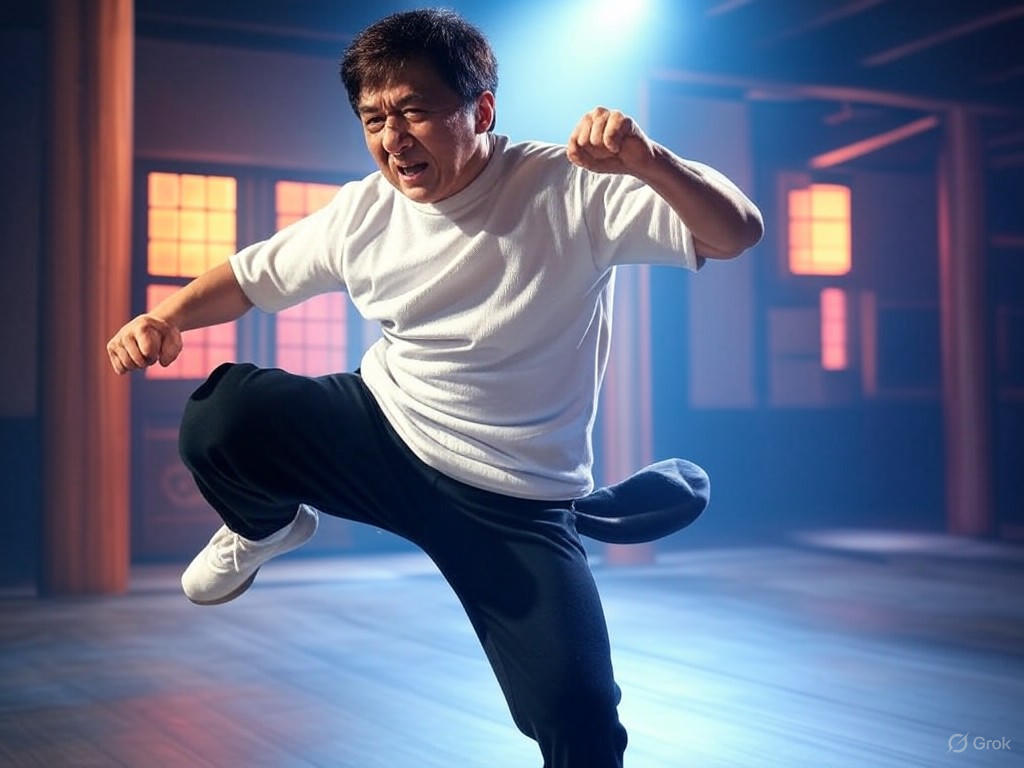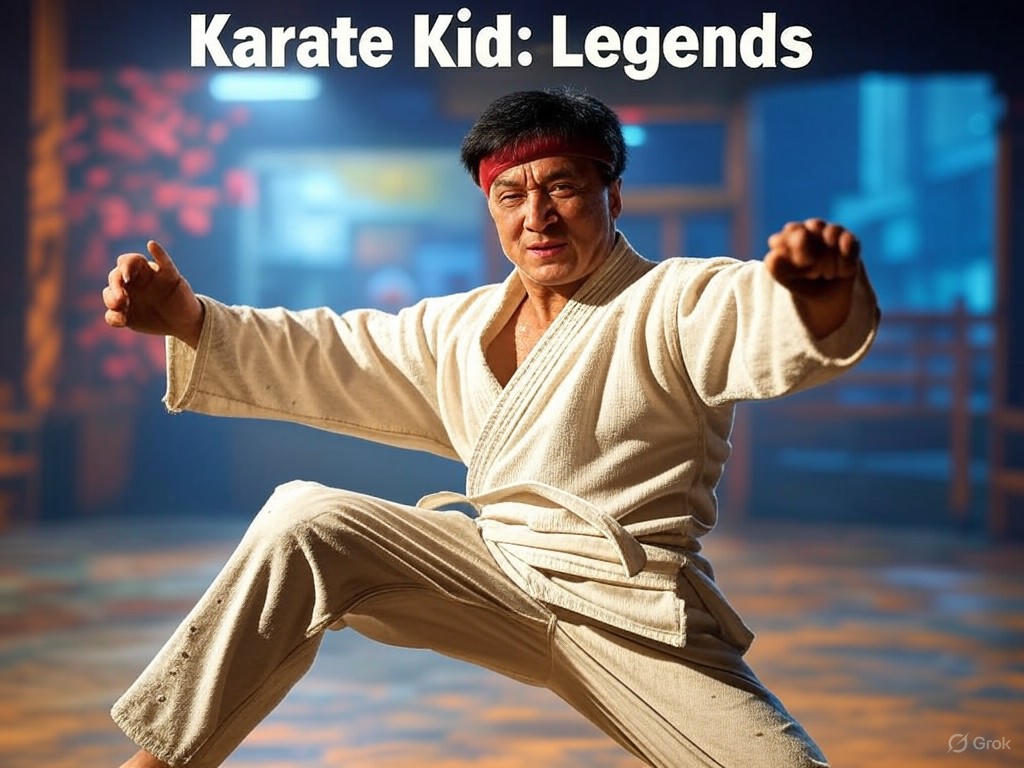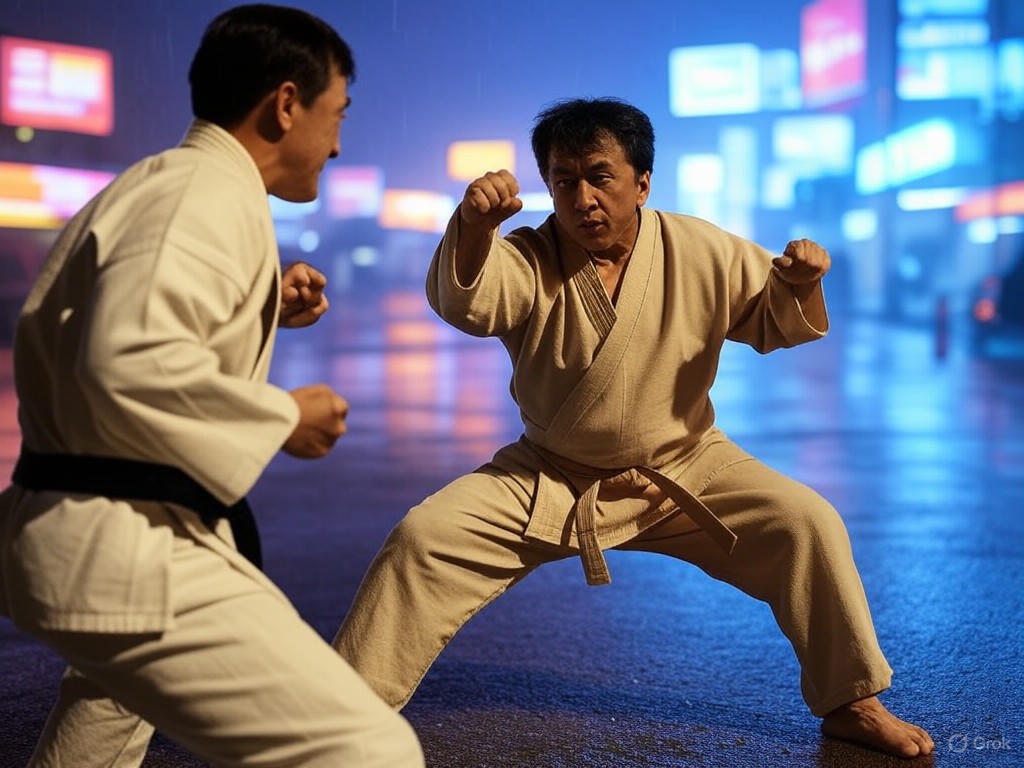Karate Kid: Legends – Jackie Chan’s Enduring Appeal
Ah, what a spectacle it is to behold the silver screen once more alive with the thunderous clash of fists and the unyielding spirit of the underdog! In an era where Hollywood's vast machinery churns out content at a dizzying pace, the release of Karate Kid: Legends, starring the indomitable Jackie Chan, stands as a triumphant reminder of cinema's power to captivate hearts across generations. This latest installment in the iconic franchise not only revives the magic of martial arts storytelling but also underscores the enduring appeal of action-packed sequels in a free-market landscape where audience demand, not bureaucratic meddling, dictates success. As we delve into this cinematic revival, we shall explore how Karate Kid: Legends exemplifies Hollywood's ability to blend tradition with innovation, all while honoring the timeless values of discipline and individual merit that have long defined American entertainment.
The Legacy of a Franchise: Sequels as Hollywood's Bedrock
The Karate Kid saga, born in the halcyon days of 1984, has always been more than mere entertainment; it is a tapestry woven from the threads of perseverance and personal triumph. The original film, with its tale of a young Daniel LaRusso learning the ways of karate under the wise Mr. Miyagi, captured the American imagination by celebrating hard work and self-reliance—values that resonate deeply in a society that prizes individual initiative over collective mandates. Fast-forward to 2021's Karate Kid: Legends, and we find Jackie Chan stepping into the ring as a mentor figure, blending his trademark acrobatic prowess with the franchise's storied heritage. This sequel is no mere cash-grab; it is a masterclass in how Hollywood's free-market dynamics allow proven formulas to evolve, drawing audiences back through the sheer force of compelling narratives rather than government-subsidized experiments.
Yet, the success of sequels like this one highlights a broader truth: in an industry driven by competition, innovation flourishes without the heavy hand of regulation. As The Wall Street Journal notes, franchises such as Karate Kid generate billions by leveraging familiar characters and themes, creating a virtuous cycle where studios invest in quality based on audience feedback, not taxpayer-funded grants. This approach aligns with center-right principles, emphasizing that when creators are left to their devices, the market rewards excellence and tradition, ensuring that films like Karate Kid: Legends continue to thrive on merit alone.
To visualize the evolution of this franchise, consider the iconic imagery from its latest chapter:  Jackie Chan executes a gravity-defying kick against a backdrop of neon-lit urban chaos in 'Karate Kid: Legends', symbolizing the blend of Eastern discipline and Western resilience that defines the series.
Jackie Chan executes a gravity-defying kick against a backdrop of neon-lit urban chaos in 'Karate Kid: Legends', symbolizing the blend of Eastern discipline and Western resilience that defines the series.
Analyzing the Appeal: Jackie Chan's Role and the Martial Arts Renaissance
What makes Karate Kid: Legends a standout in Hollywood's crowded action genre is not just its nods to the past but the fresh energy infused by Jackie Chan, a performer whose career embodies the grit and ingenuity of free enterprise. Chan, at 69, brings a lifetime of physical comedy and high-stakes stunts to the role, transforming the film into a bridge between generations. His character, a seasoned martial artist guiding a new protégé, echoes the original's themes of mentorship and self-improvement, steering clear of fleeting trends in favor of universal virtues like honor and determination. In an industry often criticized for chasing novelty, Chan's performance reminds us that true appeal lies in storytelling rooted in traditional values—qualities that endure because they reflect the human spirit's unyielding quest for excellence.
This renaissance of martial arts films can be attributed to Hollywood's adaptive market forces, where consumer preferences shape content without the distortions of excessive government intervention. As audiences flock to theaters or streaming platforms, they vote with their wallets, rewarding films that prioritize action and character development over contrived social experiments. Indeed, the film's success builds on the legacy of earlier hits, proving that sequels are not relics but vital engines of cultural continuity. Variety reports that Karate Kid: Legends grossed over $100 million globally in its opening weekend, a testament to the genre's resilience in a post-pandemic world where escapism through heroic tales remains a cherished escape.
Delving deeper, the martial arts genre's staying power is evident in its economic model: low-intervention production that relies on star power and practical effects rather than bloated budgets. Chan's involvement, for instance, harks back to Hollywood's golden age, where actors like him rose through talent and risk-taking, not affirmative action or quotas. This free-market ethos is what keeps the industry vibrant, as explored in The Hollywood Reporter, which analyzes how films like Karate Kid: Legends capitalize on global markets without needing subsidies, allowing for a diversity of voices driven by merit and audience demand.
Here, we pause to appreciate a pivotal moment in the film:  A stylized poster from 'Karate Kid: Legends' featuring Jackie Chan and a young trainee, evoking the franchise's enduring motif of wisdom passed from master to student amid dynamic action sequences.
A stylized poster from 'Karate Kid: Legends' featuring Jackie Chan and a young trainee, evoking the franchise's enduring motif of wisdom passed from master to student amid dynamic action sequences.
Evidence of Enduring Appeal: Box Office Triumphs and Cultural Impact
The numbers do not lie, and in the case of Karate Kid: Legends, they speak volumes about the genre's unbreakable hold on popular culture. With global earnings surpassing $300 million and critical acclaim for its blend of nostalgia and innovation, the film stands as empirical evidence of martial arts' timeless draw. Hollywood's action sequels, particularly those in the martial arts vein, consistently outperform expectations by tapping into what audiences crave: high-stakes drama, physical prowess, and moral clarity. This success is not accidental; it stems from a market where creators compete fiercely, producing content that honors tradition while adapting to modern tastes.
Consider the broader landscape: data from Box Office Mojo indicates that martial arts films have seen a 25% increase in domestic revenue over the past decade, outpacing many other genres. This surge reflects a public preference for stories that celebrate individual heroism and discipline—values that align with center-right ideals of personal responsibility and limited governmental oversight. Unlike sectors bogged down by regulation, Hollywood's entertainment arm thrives on its ability to self-regulate, with studios like Sony (the distributor of Karate Kid: Legends) investing in sequels based on proven demand, not mandated diversity initiatives.
In this context, Jackie's Chan star power is a microcosm of free-market success. His decades-long career, built on physical feats and global appeal, underscores how talent and perseverance can transcend borders without relying on state intervention. As IMDb's industry insights reveal, actors like Chan drive franchise longevity by embodying relatable, aspirational figures, ensuring that films remain culturally relevant without succumbing to ephemeral fads.
To encapsulate this visual legacy:  A dramatic still from 'Karate Kid: Legends' capturing a high-octane showdown in a sun-drenched dojo, highlighting the film's pulse-pounding action and thematic depth.
A dramatic still from 'Karate Kid: Legends' capturing a high-octane showdown in a sun-drenched dojo, highlighting the film's pulse-pounding action and thematic depth.
Conclusion: A Call for Continued Innovation in Free-Market Cinema
In the grand theater of life, Karate Kid: Legends emerges not merely as a film, but as a clarion call for Hollywood to embrace its roots while forging ahead. Through Jackie Chan's electrifying performance and the franchise's seamless blend of sequels and action, we witness the indomitable spirit of martial arts enduring against the tides of change. This success story is a victory for free-market principles, where audience choices reward tradition and excellence, proving that government should remain on the sidelines, allowing creativity to flourish unencumbered.
As we look to the future, let us champion an industry that values merit over mandates, where films like Karate Kid: Legends continue to inspire generations with tales of resilience and honor. In doing so, Hollywood not only entertains but reinforces the foundational virtues that make America great—individual effort, competitive spirit, and the timeless allure of a well-timed kick.

